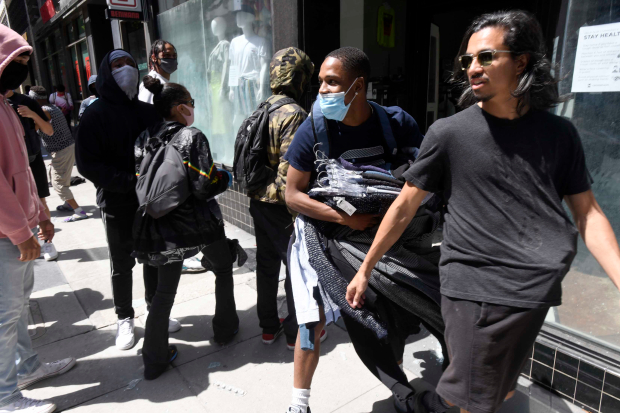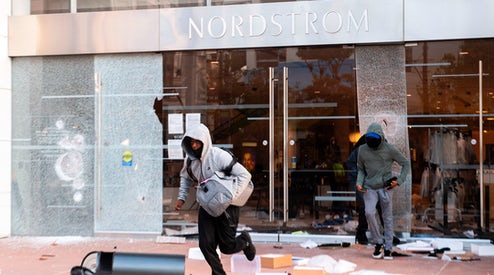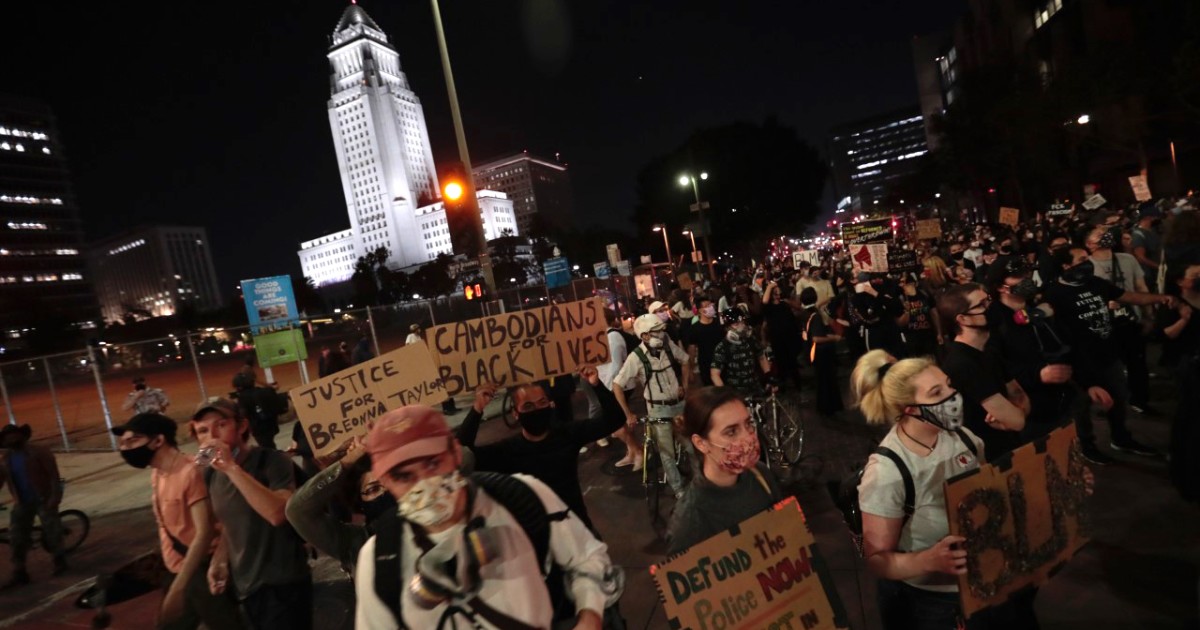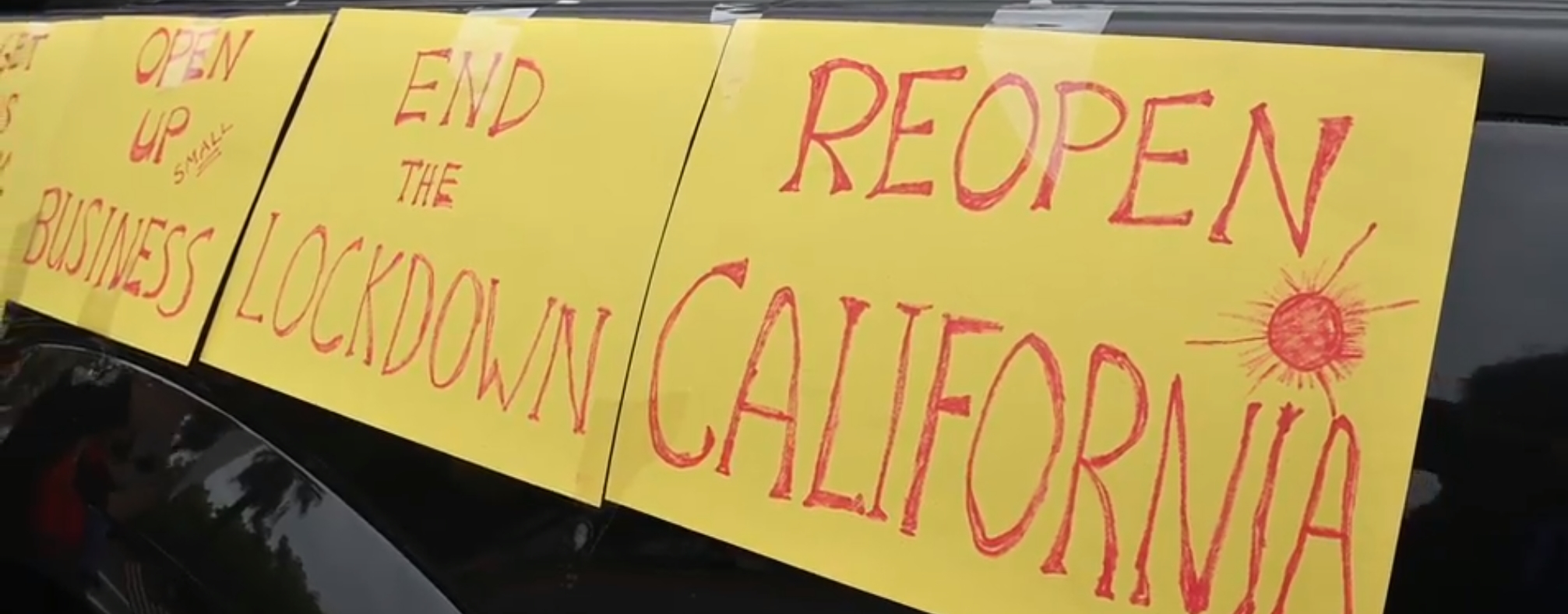
Looters in Santa Monica. (Photo: Youtube)
Rioters Explain How and Why the George Floyd Protests Have Lasted So Long
California has become an epicenter of protests, riots, and calling for justice
By Evan Symon, June 9, 2020 6:42 am
Since May 26th, one day after George Floyd died after a police officer held him down by the throat with his knee in Minneapolis, protests and riots have erupted across the United States and around the world. Unlike protests and unrest following other incidents of police involved deaths such as Eric Garner in New York in 2014 and Freddie Gray in Baltimore in 2015, the George Floyd riots and unrest has lasted much longer, has spread nationwide, and has caused considerably more damage.
California has already seen everything from Mayor resignations to proposed bans on police choke holds to riot reimbursements all due to the protests and riots, but they have not let up.
The California Globe contacted dozens of protesters across California and asked why they were still out there two weeks later.
Little Change Happening
One issue almost every protester brought up was how nothing was changing regarding police force against minorities – African-Americans in particular.
“Right after Trayvon Martin was killed in Florida in 2012, my dad had a talk with me,” said LaMarcus Chambers, a protester from Inglewood. “Every black kid knows this talk. It’s the one explaining what to do when a cop confronts you or pulls you over, what to do, and most importantly, why it’s happening.”
“My older cousin just had to give that talk to his son. It was almost word for word from what my dad told me, which was also the same when my dad got his in the 70’s or 80’s.”
“Nothing has changed. This is why we’re mad. We keep getting gunned down by police, and most don’t even make it to trial, or if they do, they get off.”
Another protester in Los Angeles gave a similar view.
“I’ve heard a lot of arguments that it wasn’t because they were black, it was because they were criminals,” added Jeanie Duke. “But then why use deadly force and kill them if they had no weapons or weren’t a threat? Why go into a house without warning and start firing when the home owner was startled and drew a gun for protection, and then an innocent EMT is killed?”
“It’s not about the criminal aspect. It’s about the brutality used against us. Look at Rodney King in 1992. Yes, he was a criminal, and yes, he should have been arrested because he was driving under the influence and wasn’t pulling over. Doesn’t matter what race you are, that’s bad.”
“But look at the force used in subduing him. It was horrific. They nearly crippled him. Freddie Gray’s death was under similar circumstances.”
“It’s just always been like this. We’re so sick of being afraid of the police, for being falsely accused, for being rough with us over something trivial or minor. It just never ends.”
“George Floyd just sparked something for everyone. It was like we knew this time it was different. And it has been. The LAPD lowered their police budget and the Minneapolis PD might get defunded. We’ve gotten some change. But we’re still out there because it’s not enough.”
A history of race and police accountability
The history of police brutality, specifically in California, has also played a role in the staying power of protests in the state.
“Besides Rodney King in ’92, there’s the Watts riots and the MLK assassination riots in the 60’s and the Oscar Grant outpouring in 2009 when he was shot and killed by a cop in Oakland at a BART station,” said Charles Mullen, a history teacher who was protesting in San Francisco last week. “California has always been at the epicenter of these sorts of things.”
“In the 40’s there was the Zoot Suit Riots against Hispanics. Inequality in the 60’s and government mistrust in the 70’s, as well as police accountability and brutality issues, led to the growth of radicals in California such as the Black Panthers and the SLA (Symbionese Liberation Army), who were all very much against the police and compared them to fascists. The LGBT community made huge strides with Harvey Milk leading protests in the Castro District in San Francisco in the 70’s too. The 80’s had the war on drugs, which brought into power many gangs who were especially against the police, such as the Bloods and the Crips.”
“And then there’s been many issues and fights and deaths and protests since the 90’s. The O.J. Simpson defense team in ’95 very clearly used this , and the Rampart Scandal in the LAPD also inadvertently showed bias in the police force.”
“Nationally, man, just pick a year and you’ll see a huge scandal with police and African-Americans leading back to the civil war and beyond, and that has helped fuel protests in California too. LA and San Francisco had protests and vigils for the Tamir Rice incident for example. California has always had a stake in all of this, and that’s why they’ve been one of the bigger forces during the George Floyd protests. And all of those years of feeling ignored and not seeing justice, well, that’s keeping the protests going.:
“It’s always been happening. But this time a protest really stuck.”
Unemployment and Summer
The fact that 20-25% of California’s workforce is still out of work, combined with the advent of summer when school and college students are off, has led to a large populace able to participate in protests for more than a weekend.
Nearly half of the protesters in contact with the Globe said that they were off for one of those reasons, with the other half saying that working from home and during reduced hours would give them the extra free time to participate.
“A lot of us couldn’t sustain this otherwise,” noted David Marot, a college student in Roseville. “Normally I’d go for an internship somewhere, but nowhere is hiring. And then George Floyd came up, and after seeing his horrific death, it inspired me to do something. I pushed a lot of people to protest.”
The lack of employment was a larger factor for others as well.
“I’m out of work. If this happened when I still worked at an office, I’d just see it on my phone, think ‘that’s too bad’ and leave it there,” explained Charlotte Weber, a protester in Los Angeles. “This really opened my eyes to the injustices. I had friends not even protesting who had tear gas shot at them.The police aren’t helping their case the way I see it.”
“So yeah, I’m protesting all of it. It got me mad.”
Different generations views on police and racial issues
Millennials and Generation Z are more aware of police brutality and both generations have generally fallen in line with being on the side of disenfranchised groups in situations such as the George Floyd protests.
“It’s not to0 fair to say that every baby boomer is all for the police and every Millennial hates the police for going after minorities more, but there is a generational difference,” said opinion researcher Kim van Oort. “That’s why we’ve been seeing a lot of younger people. They grew up in the wake of Rodney King, as well as things like Columbine. Generation Z especially grew up in the era of school shootings and seeing police brutality against minorities on TV.”
“That’s why there’s been that many out there. We also have a more diverse nation now than even 30 years ago, so a lot more people emphasize with other races and backgrounds.”
“The interesting thing is, when I ask some of these younger people of what changes they would make, they don’t just say ‘get rid of them.’ They’re solutions and laws that lawmakers now are proposing. More oversight, less brutal methods, no more racial profiling, and so on.”
“It’s like the civil rights movement the baby boomers and the silent generation fought for over 50 years ago in terms of generation divide. That was important and needing changing then, and they believe this needs changing now, specifically when in comes to police accountability.”
The protests currently don’t show any sign of slowing down, especially in California. Some areas still have curfews, and some are still under watch for the return of riots or more police being sent out.
“Don’t listen to what rioters or people chanting ‘F- the police’ are saying,” added Santa Barbara protester Lucas Smith. “Look at the ones who are peacefully demonstrating and being civil. Look at what they want: justice for George Floyd’s family, reevaluating the police in the country, making steps to change any and all racial bias.”
“[Senator] Mitt Romney (R-UT) and [Representative] John Lewis (D-GA) went to rallies for this. If conservative and liberals leaders like these agree on something like that, I think that’s worth paying attention too.”
“It’s clear things need to change. And a good place to start is where Republicans and Democrats agree.”
“Who doesn’t think justice should be served anyway?”





Let’s see, I keep getting away with stealing anything I want, whenever I want, from whoever I want. I can pack up loot by the truckload, drive away and come back for more, all without any consequence whatsoever. And, if I feel like it, I can bust things up just because I feel like it, and that’s kind of fun, too. So, why ain’t I stopping? Cause there’s still so much stuff I can get, and I’m free to do whatever I please, that’s why.
““Right after Trayvon Martin was killed in Florida in 2012, my dad had a talk with me,” said LaMarcus Chambers, a protester from Inglewood. “Every black kid knows this talk. It’s the one explaining what to do when a cop confronts you or pulls you over, what to do, and most importantly, why it’s happening.””
Historically, I get this, but this is nothing that any conscientious parent doesn’t teach his son/daughter. Most recently, I taught my granddaughter “The Procedure” when you get pulled over by a PO while in a vehicle, including keeping both hands on the wheel when the officer approaches from the rear, being respectful, being mindful of her rights and responsibilities, etc.